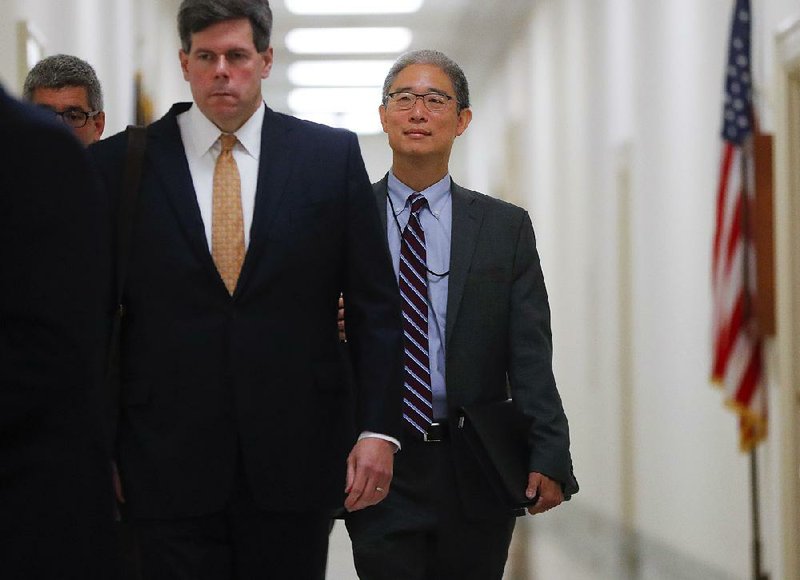WASHINGTON -- Bruce Ohr was a relatively anonymous lawyer at the Justice Department for more than 25 years. But he's now caught up in a Republican maelstrom of criticism toward the department, with some of President Donald Trump's allies implying that he helped conspire against Trump's election.
Two GOP-led House committees interviewed Ohr privately Tuesday as part of an investigation into decisions made by the department in 2016. They are interested in Ohr because of his relationship with Christopher Steele, the former British spy whose opposition research on Trump's Russia ties was compiled into a dossier and turned over to the FBI.
At least seven Republican House members traveled to Washington for the interview, which was held during the House's August recess. No Democratic lawmakers appeared to attend, though staff members were in the room.
A Harvard-educated lawyer who was a federal prosecutor in Manhattan in the 1990s, Ohr later oversaw the Justice Department's organized crime and racketeering section and, at the time of the presidential election, was a high-ranking official in the deputy attorney general's office with oversight of a program that doles out grants to federal prosecutors for complex drug trafficking cases.
Ohr's relationship with Steele has given fodder to Republican critics in Congress and raised concerns that he was operating outside his job description.
The two had met a decade earlier, bonding over a mutual interest in Russian organized crime and forging a friendly relationship that persisted over the years.
Though Ohr did not handle national security or counterintelligence work in the deputy attorney general's office, he nonetheless became a point of contact for Steele to share information with in the months leading up to the 2016 presidential election. Ohr passed along tidbits he learned to the FBI, which was conducting its own investigation.
The co-founder of Fusion GPS, the political research firm that hired Steele for the investigation, told House lawmakers in a private meeting last year that he also met with Ohr at Steele's behest amid what he said was anxiety that federal investigators were not taking seriously enough the threat of Russian election interference and the information that Steele had accumulated.
"And so Chris suggested I give some information to Bruce, give him the background to all this. And we eventually met at a coffee shop, and I told him the story," said Glenn Simpson, who helped start the firm.
Aside from their own personal connection, Ohr's wife, Nellie, was working at Fusion GPS -- a connection Trump and his allies have seized on as they allege anti-Trump bias in the department.
During breaks from the interview, several of the GOP lawmakers said Ohr's testimony differed from Simpson's and shed new light on the credibility of the dossier. But they would not give details.
Peter Strzok, the recently fired FBI agent who led the Russia investigation, told Congress last month that Ohr provided the FBI with "material that I believe originated from Mr. Steele," though he said he never personally received information from Ohr. Strzok said he met with Ohr as many as five times in late 2016 and early 2017.
The dossier also was not the linchpin of the FBI's investigation into potential coordination between Russia and the Trump campaign. That investigation had begun months before the bureau received those files in September 2016, and was triggered by information about George Papadopoulos, a Trump campaign aide who told a professor the Russians possessed "dirt" on Clinton in the form of emails.
Strzok also said it was "not Mr. Ohr who provided the initial documents that I became aware of in mid-September."
Nevertheless, Republicans have suggested the dossier created a politically tainted pretext for the investigation. Ohio Rep. Jim Jordan, a Republican who has led criticism of the Justice Department and the FBI, called Strzok's revelation in the hearing "amazing."
The interviews have been part of a larger campaign to question special counsel Robert Mueller's investigation into Russian election interference and potential coordination with the Trump campaign. Rep. Matt Goetz, one of the Republicans who attended the interview, said that, so far, Ohr's interview and others have shown an "excessive reliance" on the dossier.
Democrats say the entire GOP investigation is an attempt to undermine Mueller. They have criticized the Republican's focus on Ohr as overblown and misleading.
"Bruce Ohr took the initiative to inform the FBI of what he knew, and the majority does him a grave disservice by suggesting he is part of some malign conspiracy," wrote Democrats on the House intelligence committee in a declassified memo earlier this year.
A Section on 08/29/2018

